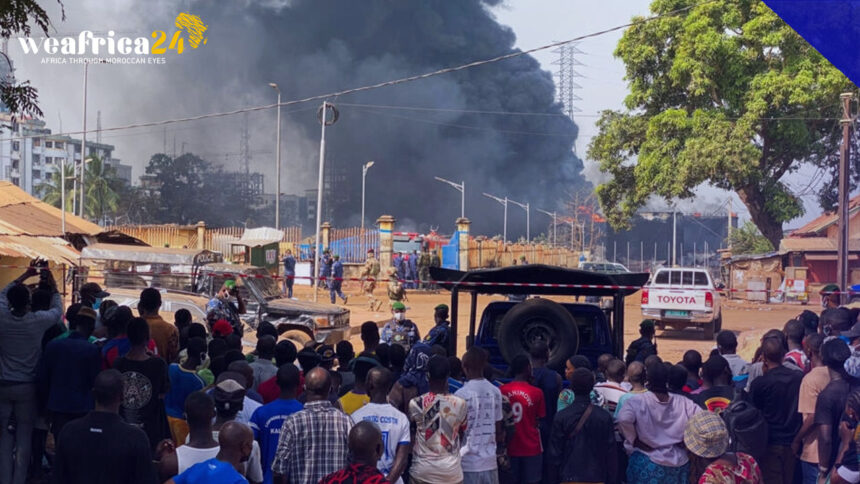In the aftermath of the explosion and subsequent fire at Guinea’s primary oil terminal in Conakry’s Kaloum district, the government is actively monitoring and studying pollution levels, particularly concerning microparticles. As a precautionary measure, the state has mandated the compulsory use of masks in the Kaloum peninsula.
The incident occurred a week ago, on Monday, December 18, shortly after midnight, resulting in a powerful explosion that obliterated a fuel depot in Kaloum. The explosion engulfed the hydrocarbon depot of the Guinean Petroleum Company, the country’s primary facility, in a massive fire.
The capital city of Guinea was shrouded in thick black smoke, prompting Colonel Mamadi Doumbouya, the transitional leader, to declare three days of national mourning in tribute to the victims. The disaster claimed at least 23 lives and left 241 individuals injured, according to the Guinean government’s official tally.
On the health front, ongoing studies are being conducted to ascertain pollution levels, particularly those related to microparticles. The government has mandated mask usage in the Kaloum peninsula in response to potential health risks.
There has been no notable increase in respiratory-related admissions at Conakry’s Ignace-Deen University Hospital. Professor Boubacar Diallo, a neurologist, highlights the risks associated with petroleum fumes, including nitrogen dioxide and sulfur dioxide, known irritants for the nose, throat, sinuses, and respiratory system in the short term. He also notes the presence of benzene, a known carcinogen, albeit in low concentrations, suggesting a minimal long-term cancer risk.
Addressing the precautions residents should take in Conakry, Dr. Diallo emphasizes that the city already grapples with a baseline pollution level. He suggests that wearing masks can reduce the risk of inhaling harmful substances. Additionally, especially for vulnerable individuals, staying indoors for as long as possible, with closed windows, is advised to prevent particulate matter from entering homes.
This incident has compounded the existing pollution challenges in Conakry, and these recommendations aim to mitigate the potential health impacts on its residents. As the studies on pollution levels progress, further measures may be implemented to safeguard public health and the environment.







